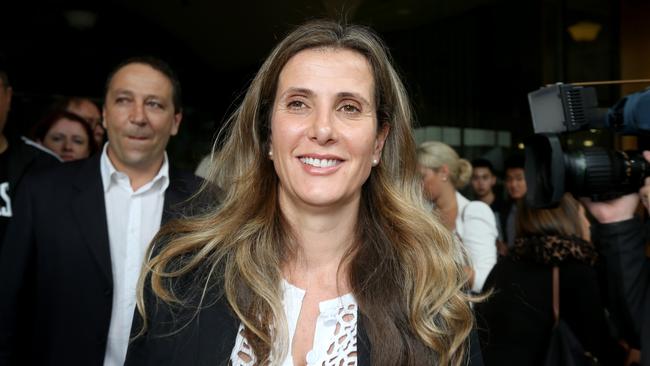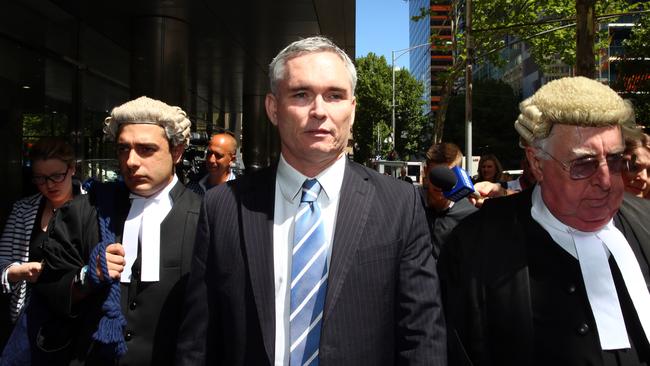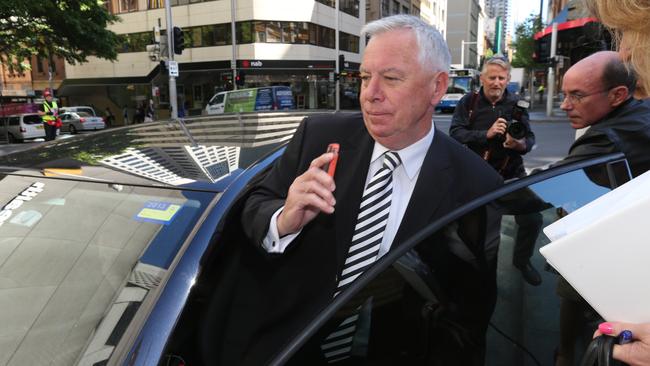‘Brave decent woman’ Kathy Jackson was just a criminal in the end
The dark saga of Kathy Jackson demonstrates how, with a slickly honed message and shortage of available facts, the public can be manipulated into believing a fake narrative.

Jackson was hailed as a hero nine years ago for exposing the large-scale corruption of two fellow leaders from the Health Services Union, Michael Williamson and Craig Thomson.
Tony Abbott praised her at the time as a “brave decent woman” while Christopher Pyne said she would be “remembered as a lion of the union movement”.
Now Jackson is revealed for what she really was: a criminal just like the others.
Judge Amanda Fox sentenced Jackson in Victoria’s County Court on Thursday to two years’ jail, suspended, for defrauding the HSU of $102,892 over an extended period of 2003 to 2010.
The Jackson sentence marks the end of a dark corruption saga that “trashed” the HSU’s reputation, as current national secretary Lloyd Williams expressed it in a victim impact statement read to the court.
That Jackson was ever considered courageous is a demonstration of how, with a slickly honed message and shortage of available facts, the public can be manipulated into believing a fake narrative.
The deeper importance of this saga is how, in its entirety, it is about a rotten culture that reached deep into the heart of the union movement and the Labor Party as well.
The core of corruption at the HSU was unauthorised spending and a misplaced sense of entitlement by people in positions of power who thought they could use other people’s money as they wished. Allegations of this sort still hang over others including the Australian Workers Union as it battles claims that large sums of members’ funds were used without authorisation to finance political campaigns, including Bill Shorten’s original quest for a Labor seat in parliament.

Williamson was sentenced to 7½ years’ jail in March 2013 and served five with parole after pleading guilty to defrauding $1m of HSU members’ money. He’d run the HSU’s large NSW branch since 1996 with an iron hand. An absence of proper accounting practices paved the way for Williamson’s systematic theft of HSU funds to finance a lavish personal lifestyle that was apparently unquenchable and approaching obscene in its excess.
Williamson was also a senior if shadowy figure in the ALP, influential in the party’s dominant NSW Right faction. He served a stint as the ALP’s national president and relished his close contact with Labor prime ministers Kevin Rudd and Julia Gillard.
Thomson, too, had a foothold in both the HSU and Labor. As a Williamson protege in the HSU’s NSW branch, Thomson was parachuted into the then Melbourne-based job of national secretary. It was during this period between 2002 and 2007, as he campaigned for the federal Labor seat of Dobell back in NSW, that Thomson indulged in his own corruption.
It was first exposed in April 2008, after he’d entered parliament, when Sydney Morning Herald journalist Mark Davis reported that Thomson had allegedly used his HSU credit card to spend more than $100,000 without any authorisation on prostitutes and to fund his election campaign.
Davis’s reporting was solid, based on evidence-based audit documents. Nevertheless, the Thomson case could have slipped from public attention, or Labor could have quietly got rid of him, except that his vote in parliament became critical to the one-seat majority of the Gillard government after the 2010 election. Labor did whatever it could to keep Thomson, despite huge embarrassment.
Thomson eventually was charged by police in Victoria and faced court, but the dollar amount of his alleged thieving was reduced, bit by bit, because of bungling in the framing of charges against him. A magistrate eventually found Thomson guilty in February 2014 of stealing $24,538 and sentenced him to three months’ jail time, plus a further nine suspended. On appeal, Thomson’s theft total was reduced to less than $5000 and he escaped with a $25,000 fine.
A separate indication of Thomson’s actual unauthorised spending can be gleaned from a Federal Court decision in September 2015 — following a case brought against him by the Fair Work Commission — that he pay the HSU $231,234, plus $146,937 interest.
Enter Jackson, another impostor. Jackson became the secretary the HSU’s small No 3 branch in Victoria in 1996, representing health professionals. Her influence extended wider than her union numbers suggested because she operated in an alliance with the much larger HSU No 1 branch, controlled for a while by her then husband, Jeff Jackson.
Both were players in the Victorian ALP Right because they could use their combined union numbers to command critical votes on the floor of the party’s conference. Kathy Jackson was close to David Feeney, later a Labor senator. She also had an on-again, off-again friendship with Shorten until a final ugly falling out in 2007.
Although from a younger generation and different state, Jackson was very friendly with Williamson. So chummy did Jackson and Williamson become that they agreed to a marriage of their two HSU branches, plus the Victorian No 1 branch, to form a single unit in May 2009 called HSU East. Both were to have leading roles in HSU East — but relations quickly soured.

The nub of Jackson’s discontent was a belief, with good reason, that Williamson wanted to edge her out as national secretary. The main bugbear, related, was Jackson’s sudden lack of control and easy access to union money. Jackson had been accustomed to directing her HSU No 3 office bookkeeper, Jane Holt, to shift HSU funds where she wanted them to go. She also had a very compliant branch committee of management that said yes to everything or was unaware of her spending habits.
When the strains reached breaking point in September 2011, Jackson went to NSW police with allegations Williamson had misappropriated union money to fund his lifestyle. She also made similar allegations against Thomson, although he had been out of the HSU for almost four years and was already the subject of scandalous allegations.
Allegations about Jackson’s own misconduct did not become widely known until early 2014, near the start of the Abbott government’s royal commission into union corruption. It took dogged reporting by journalists Nick McKenzie and Ben Schneiders at The Age, particularly the revelation that Jackson had set up a secret HSU-funded $284,000 bank account, forensic reporting by me at The Australian, plus some genuine whistleblowing by Craig McGregor, now the head of Jackson’s former HSU No 3 branch following the collapse of Williamson’s HSU East.
It turned out Jackson was not just imperfect or flawed: she was a crook. Her conviction, for dishonestly claiming more than $100,000 of her union members’ money as work expenses over an extended period, confirms the HSU served as a personal piggy bank. She used HSU funds for many overseas holidays, shopping trips, home furniture, DVDs, gifts, artwork and a car for her former husband, Jeff. On four occasions the HSU paid for travel by Jackson’s subsequent partner, Michael Lawler, then vice-president of the Fair Work Commission.
Jackson has shown no remorse. All along, her defence has been that any expenditure was properly authorised and therefore legal. Jackson’s other argument, used to mitigate any wrongdoing, is the alleged public good of her whistleblowing. It was used again in sentencing submissions put to Justice Fox as a reason for leniency.
In fact, Fox relied mainly on other factors, such as Jackson’s saving the time and expense of a second trial by agreeing to a plea on two “rolled-up” charges, following a first jury trial on 21 other charges, held secretly in October last year, that led to a guilty finding on two. Fox told the court on Thursday that she could not determine whether Jackson went to NSW police about Williamson and Thomson out of genuine remorse or self-interest to deflect attention away from her own wrongdoing.
The facts all point to the latter. Jackson went to police as a pre-emptive move against Williamson before he moved on her. Once Williamson was out of her way, Jackson ran her own candidates in the three re-formed branches of the HSU, following the dissolution of HSU East. They lost. It is almost certain, if Jackson had gained control of those branches, that details of her misconduct would have stayed buried.
Jackson was the whistleblower of nothing in the end because all she gave NSW police in September 2011 was the vague edges of a story, with no hard evidence.
Her central allegation was based on snippets of an old story told to her in 1999 by Carron Gilleland, co-owner of a company called Communigraphix that printed the NSW HSU’s journal. Gilleland had complained back then that Williamson required she and her husband to issue Williamson and Thomson with American Express cards for their personal use, and to cover the costs by pumping up their printing bills.
The problem for Gilleland, pressured into this arrangement and not wanting to lose the printing contract, was that Williamson was spending too much on the Amex card. She wanted Jackson to use her influence with Williamson and urge him to cut back. Jackson did nothing, and the credit cards were cancelled anyway when Williamson found other ways to embezzle union funds. Jackson sat on this information for 12 years until she fell out with Williamson.
With no usable evidence regarding the Amex cards, NSW police had nothing to go on. They set up Strike Force Carnarvon because political and media pressure was intense to investigate — but they needed to start from scratch. Police nabbed Williamson only because he pleaded guilty after detectives gathered incriminating evidence and warned that Williamson’s wife Julie and son Christopher would be charged if he did not co-operate.
Jackson also played no part in exposing Thomson’s crimes. Thomson’s name was already in wide circulation in 2011 because of Davis’s journalism three years earlier. Jackson happily accepted, or did not deny it, that she was the whistleblower behind Davis’s story. This was false. Davis knows the identity of the source, obviously, and so do I. The anonymous source was a genuine whistleblower, not Jackson the pretender.
Jackson’s role in the Thomson part of this saga is the opposite of what she claims: she sought to bury allegations against Thomson, in cahoots with Williamson, when they were still buddies.
On the ABC’s Lateline program in 2011, Jackson said she had asked for an HSU “exit audit” on Thomson after he left for a seat in parliament. In fact she worked with Williamson in March 2008 to shut it down by supporting a draft HSU national executive resolution to halt the exit audit.
That resolution also sought to “retrospectively authorise” all of Thomson’s spending, which would have buried the issue forever. The resolution was withdrawn because of agitation by a noisy minority at the executive meeting who’d become increasingly disturbed about wild unauthorised spending. It was a month after this meeting that the anonymous source went to Davis.
One of Jackson’s other key defences to mitigate any egregious behaviour is that she swam in a “dirty shark-infested pool” with Williamson and Thomson. This claim is also false. All criminal charges against Jackson related to her spending over a seven-year period when she headed the Victorian HSU No 3 branch, completely separate from others branches and their control.
Jackson’s conviction for thieving more than $100,000 may well be the end of the matter because this is the total sum for which she has been convicted.
However, there is another important yardstick that indicates the actual amount of HSU funds Jackson spent on herself without any authorisation. In August 2015 following a civil claim against Jackson lodged by the HSU, Federal Court judge Richard Tracey ordered her to repay the union $1.4m that he found she had misappropriated for personal benefit. Tracey included $284,500 of HSU funds that Jackson transferred bit by bit to her personal bank account. According to him, Jackson “well knew” these funds were the property of the union.





The final fall for Kathy Jackson was a long time in the making, and it came with a thud.